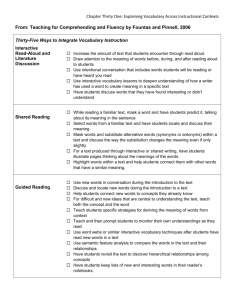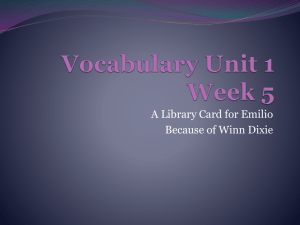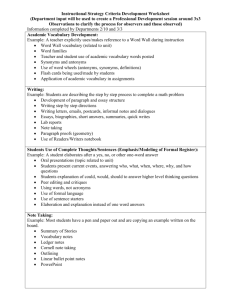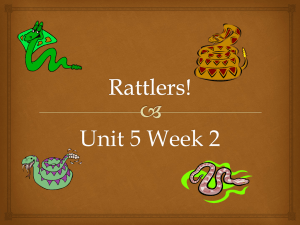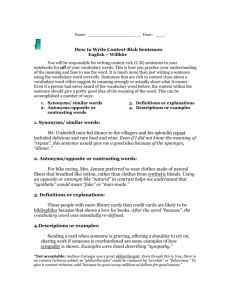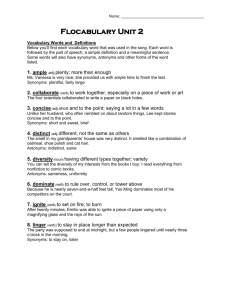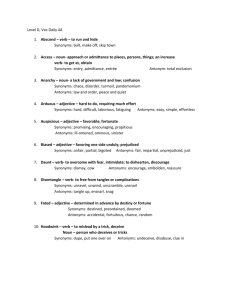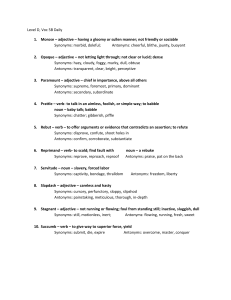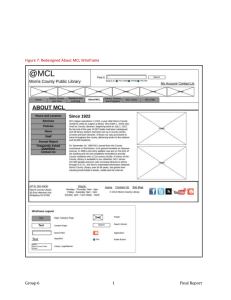ENGLISH 110: VOCABULARY WORKSHEET
advertisement
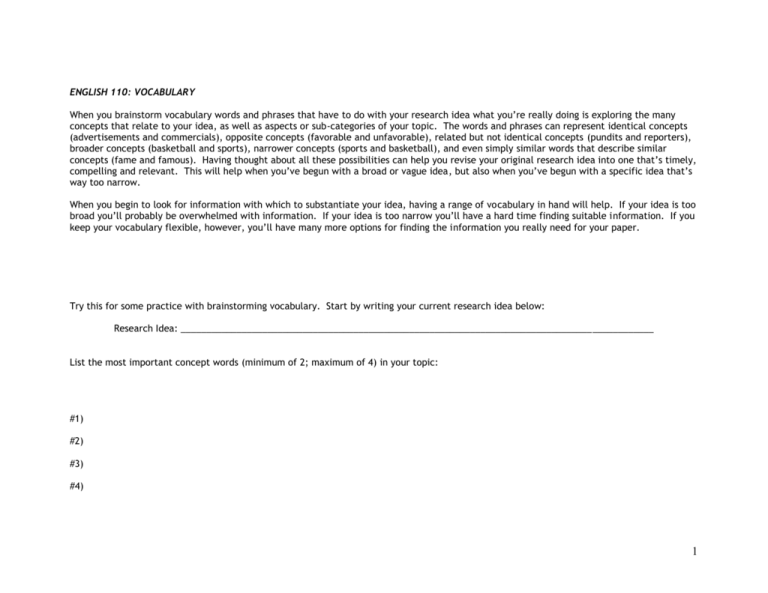
ENGLISH 110: VOCABULARY When you brainstorm vocabulary words and phrases that have to do with your research idea what you’re really doing is exploring the many concepts that relate to your idea, as well as aspects or sub-categories of your topic. The words and phrases can represent identical concepts (advertisements and commercials), opposite concepts (favorable and unfavorable), related but not identical concepts (pundits and reporters), broader concepts (basketball and sports), narrower concepts (sports and basketball), and even simply similar words that describe similar concepts (fame and famous). Having thought about all these possibilities can help you revise your original research idea into one that’s timely, compelling and relevant. This will help when you’ve begun with a broad or vague idea, but also when you’ve begun with a specific idea that’s way too narrow. When you begin to look for information with which to substantiate your idea, having a range of vocabulary in hand will help. If your idea is too broad you’ll probably be overwhelmed with information. If your idea is too narrow you’ll have a hard time finding suitable information. If you keep your vocabulary flexible, however, you’ll have many more options for finding the information you really need for your paper. Try this for some practice with brainstorming vocabulary. Start by writing your current research idea below: Research Idea: _____________________________________________________________________________________________ List the most important concept words (minimum of 2; maximum of 4) in your topic: #1) #2) #3) #4) 1 Concept word #1: ____________________________________ (If the table is stumping you, consult a dictionary (http://library.ohio-state.edu/record=e1000266~S7) or thesaurus (http://library.ohiostate.edu/record=e1000327~S7) . SYNONYMS ANTONYMS RELATED (but not synonyms) BROADER TERMS NARROWER TERMS VARIANT FORMS (e.g., teach, teaching, teacher, teachers) 2 ENGLISH 110: VOCABULARY Research Topic: _______________________________________________________________ List the 4 most important concept words in your topic: 1) 2) 3) 4) Concept word #2: ___________________________ SYNONYMS ANTONYMS RELATED (but not synonyms) BROADER TERMS NARROWER TERMS VARIANT FORMS (e.g., teach, teaching, teacher, teachers) 3 ENGLISH 110: VOCABULARY Concept word #3: ___________________________ SYNONYMS ANTONYMS RELATED (but not synonyms) BROADER TERMS NARROWER TERMS VARIANT FORMS (e.g., teach, teaching, teacher, teachers) 4 ENGLISH 110: VOCABULARY Concept word #4: ___________________________ SYNONYMS ANTONYMS RELATED (but not synonyms) BROADER TERMS NARROWER TERMS VARIANT FORMS (e.g., teach, teaching, teacher, teachers) 5 ENGLISH 110: VOCABULARY Now that you’ve brainstormed synonyms, antonyms, broader and narrower terms, and variant word forms based on your research topic’s key concepts; take some time to think about possible QUESTION WORDS AND PHRASES that you might apply to your topic, for example: IN WHAT WAY(S) TO WHAT EXTENT TO WHAT DEGREE IN WHAT SITUATIONS Use some of your brainstorming words and question words to draft 3 focused research questions that you might want to pursue. EXAMPLE: Original research topic: Media coverage of protests at health care reform town hall meetings Research question #1: To what extent have the photos of gun-toting protesters at town hall meetings shifted the focus of health care reform to gun control? Research question #2: To what degree does media coverage of protests against “death panels” promote misinformation? Research question #3: In what ways has CNN.com tilted its coverage of health care reform through its selection of images? YOUR TURN: Original research topic: Research question #1: Research question #2: Research question #3: 6

